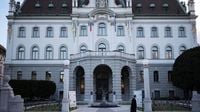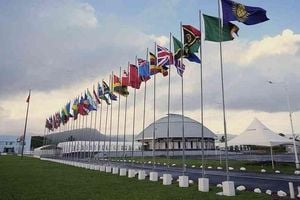Across Europe, the debate over Israel’s participation in EU-funded research has turned university campuses into battlegrounds for ethics, solidarity, and the future of scientific collaboration. The controversy has intensified in the wake of the ongoing humanitarian crisis in Gaza, where, according to the Hamas-run health ministry, more than 62,000 people have been killed since October 7, 2023. The United Nations-backed Integrated Food Security Phase Classification (IPC) declared a famine in Gaza Governorate on August 22, 2025, confirming that over half a million people are trapped in famine, and projecting that by the end of September, more than 640,000 will face catastrophic levels of food insecurity. The scale of suffering is, by all accounts, devastating—and the response from Europe’s academic world reflects both outrage and deep division.
The European Commission, in July 2025, proposed suspending Israel’s participation in certain parts of Horizon Europe, the EU’s flagship research and innovation program. Since 2021, Israeli institutions have received a net contribution of 875.9 million euros from Horizon Europe, a substantial sum that supports startups and small businesses working on dual-use technologies, including cybersecurity, drones, and artificial intelligence. The proposed suspension would specifically affect Israeli involvement in the Accelerator of the European Innovation Council (EIC), a major funding source for these high-tech endeavors.
This move followed a report from the European External Action Service (EEAS), which concluded that Israel’s actions in Gaza violate the principle of respect for human rights—a core condition embedded in the EU-Israel Association Agreement, the political and economic framework binding the two since 2000. But the Commission’s proposal did not pass. It failed to gain the necessary qualified majority among member states, with influential countries like Germany and Croatia opposing the measure. As a result, the debate will return to the table after the summer break, but the split among EU governments is stark and, for now, unyielding.
While EU-level action has stalled, universities and grassroots groups across Europe have taken matters into their own hands. Nowhere is this more evident than in Croatia, where academic circles have voiced strong criticism of their government’s stance. In July 2024, a group of scientists, researchers, academic workers, and students formed the Initiative for Academy of Solidarity and Epistemic Justice (IzASEP). Their mission? To "express solidarity with the victims of genocide in Gaza" and demand an immediate end to collaborations with Israeli institutions. The group identified at least 40 collaborative scientific research projects between Croatian and Israeli institutions, funded through Horizon Europe and Erasmus. By early August 2025, they had collected over 700 signatures on a letter expressing solidarity with Gaza. Their call is clear: an academic boycott, justified by what they describe as "connections to the military-security sector in Israel and the policy of occupation and genocide in Gaza."
Slovenian academia has also made its position known. In mid-August 2025, the University of Ljubljana called on the European Commission to suspend Israeli participation in Horizon Europe and decided to refrain from joining any projects that involve Israeli universities or organizations. This decision came after more than 200 professors and staff members, supported by their trade union, appealed to the university’s rector for action. Later in August, Klavdija Kutnar, head of the University of Primorska in southwest Slovenia, announced the school would not enter into new projects with Israel once its only existing collaboration concludes at the end of the year. The University of Maribor, Slovenia’s third major university, currently has no joint projects with Israeli partners.
Belgium, too, has seen its universities press for tougher measures. The Flemish Interuniversity Council (VLIR), representing Flemish university rectors, dismissed the European Commission’s proposal as "symbolic" and, alongside its French-speaking counterpart CRef, called for the suspension of the entire EU-Israel Association Agreement. Their rationale? What they describe as "massive and objectively documented" human rights violations in Gaza. Student activism has played a crucial role in shaping this stance. In 2023, occupations and protests at Belgian universities pushed several institutions to suspend cooperation with Israeli partners, though some collaborative projects remain. For many students and academics, Israel’s place in European research is now seen as a test of the EU’s commitment to human rights. Others, however, warn that cutting academic ties risks undermining the principle of scientific cooperation, which has long been a cornerstone of European research policy.
The debate has not remained confined to institutional statements and policy proposals. Symbolic gestures and cultural flashpoints have also come to the fore. On August 28, 2025, the Université Libre de Bruxelles’ (ULB) 2025 law graduate class voted to name their class after French-Palestinian MEP Rima Hassan. The tradition allows each graduating class to choose a symbolic name, and the decision this year was especially charged. French public figures responded with an open letter denouncing the choice of Hassan—a left-wing politician and vocal defender of Palestinian rights—accusing her of supporting Hamas. ULB’s administration, after a meeting with professors, researchers, staff, students, and authorities, approved the class’s decision, underscoring the university’s commitment to academic freedom even in the face of controversy.
Underlying these debates is the grim reality on the ground in Gaza. The famine and humanitarian crisis have now stretched into a second year, marked by Israel’s decision to cut off all aid. According to the UN, more than half a million people are now trapped in famine conditions, with the number expected to rise to over 640,000 by September 30, 2025. The consequences—preventable deaths on a massive scale—are being felt acutely by families both in Gaza and abroad. For Humza Yousaf, the former First Minister of Scotland and SNP leader, the crisis is deeply personal. His wife, Nadia, has relatives in Gaza who have described the experience as a "living nightmare." For many across Europe, the crisis is not just a distant tragedy but a call to action, demanding both solidarity and accountability.
As Europe’s academic community grapples with the ethical dilemmas posed by continued collaboration with Israeli institutions, the future of EU-Israel research ties hangs in the balance. The coming months will likely see renewed debate—both in Brussels and on university campuses—over whether scientific cooperation can, or should, be separated from the harsh realities of war and human rights abuses. For now, the patchwork of academic boycotts, institutional suspensions, and grassroots protests reflects a continent divided, wrestling with the limits of its own values in the face of a humanitarian catastrophe.




